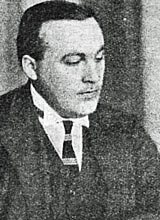
Efim Bogoljubow also known as Efim Dimitrijewitsch Bogoljubow was a Russian-born German chess grandmaster.

Triberg im Schwarzwald is a town in Baden-Württemberg, Germany, located in the Schwarzwald-Baar district in the Black Forest. Triberg lies in the middle of the Black Forest between 500 and 1038 metres above sea level.

Fedir Parfenovych Bohatyrchuk was a Ukrainian-Canadian chess player, doctor of medicine (radiologist), political activist, and writer.

Pyotr Arsenyevich Romanovsky was a Russian and Soviet chess player and author. He won the Soviet Championship in 1923 and, jointly, 1927.
Moishe (Mojżesz) Lowtzky (Łowcki) (1881–1940) was a Ukrainian–Polish chess master.

Alexander Flamberg was a Polish chess master.

Ilya Leontievich Rabinovich was a Russian and later Soviet chess player, among the best in his country for three decades, from 1910 to 1940. His best result was a shared first place in the 9th Soviet Championship of 1934-35. He was also a chess writer.

Hans Fahrni was a Swiss chess master.

Alexey (Alex) Sergeyevich Selezniev was a chess master and chess composer.
Salomon Langleben was a Polish chess master.

Boris Evgenievich Maliutin (1883–1920) was a chess master.
Samuil Osipovich Vainshtein (1894–1942) was a Russian chess master, organizer, publisher and editor.
Peter Petrovich Saburov (Sabouroff) (14 January [O.S. 2 January] 1880, Saint Petersburg, Russia – 26 March 1932, Geneva, Switzerland) was a Russian diplomat, chess master and organizer, and musical composer.
Paul Krüger (Krueger) was a German chess master.
The 19th DSB Congress, comprising several tournaments, began on 20 July 1914 in Mannheim. Germany declared war on Russia and on France, Britain joining in the next day. The congress was stopped on 1 August 1914.
 Ukraine
Ukraine  Poland
Poland  Russia
Russia  Russia
Russia  Russia
Russia  Russia
Russia  Russia
Russia  Switzerland
Switzerland 







